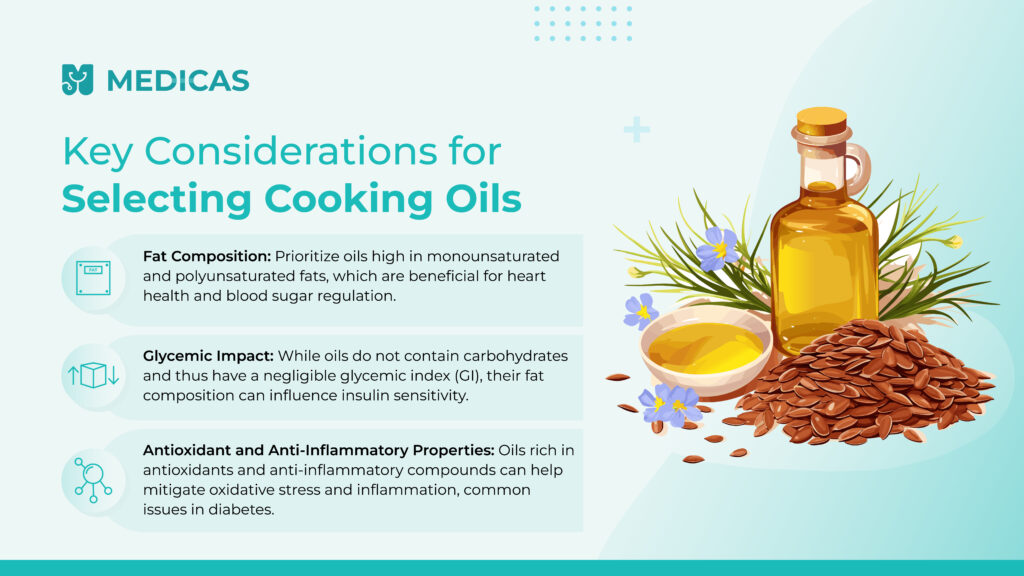Cooking oils are a cornerstone of culinary traditions, infusing dishes with flavour and providing essential fats vital for our health. For everyone, especially those managing diabetes, being mindful of oil consumption is crucial. Experts recommend limiting intake to 3-4 tablespoons per day; however, many individuals exceed this amount in a single meal. Choosing the right cooking oil plays a significant role in effective blood sugar control, management and overall health.
It is known that oils rich in monounsaturated fatty acids (MUFA) are particularly beneficial for diabetic patients. These MUFA-based oils can help lower low-density lipoprotein (LDL) cholesterol, often referred to as “bad” cholesterol, while maintaining or increasing high-density lipoprotein (HDL) cholesterol, known as “good” cholesterol. This balance is crucial for cardiovascular health, a significant concern for those managing diabetes.
Groundnut (peanut) oil, mustard oil, and sesame (gingelly) oil are notable for their high MUFA content. Incorporating these oils into your diet can be a heart-healthy choice, particularly for individuals with diabetes. It’s also important to consider regional dietary habits and personal taste preferences when choosing cooking oils. Traditional oils like mustard and sesame are staples in various cuisines and can be seamlessly integrated into daily cooking practices. Ultimately, selecting oils that are high in monounsaturated fats and align with your culinary preferences can support both enjoyment and health.
By making informed choices about the best cooking oils for diabetics, you can enhance your meals’ flavor while supporting effective blood sugar control and cardiovascular health.
Why Cooking Oils Matter for Diabetics
The cooking oils you use can influence your blood sugar control and overall health. Choosing oils rich in healthy fats can improve insulin sensitivity, lower bad cholesterol, and reduce the risk of complications that often arise from diabetes, such as cardiovascular disease. In contrast, oils that are high in unhealthy fats—particularly trans fats—can lead to insulin resistance, contributing to poor blood sugar management.
When managing diabetes, it’s essential to select oils that have a lower glycemic index (GI), are rich in monounsaturated and polyunsaturated fats, and contain antioxidants and anti-inflammatory properties. So, let’s take a closer look at some of the best options available. If you’re uncertain about the best cooking oil for you and your family, we recommend consulting with expert nutritionists on Medicas, who can offer personalized recommendations and solutions based on your specific needs.

Best Cooking Oil for Diabetics and Blood Sugar Control
When selecting cooking oils for diabetes management, it’s important to consider their fat composition, glycemic impact, and antioxidant properties. Prioritizing oils high in monounsaturated and polyunsaturated fats can benefit heart health and aid in blood sugar control and regulation. Although oils do not contain carbohydrates and thus have a negligible glycemic index, their fat composition can influence insulin sensitivity. Additionally, choosing oils rich in antioxidants and anti-inflammatory compounds can help mitigate oxidative stress and inflammation, which are common issues in diabetes.
- Olive Oil: The Heart-Healthy Choice
Olive oil, especially extra virgin olive oil, is rich in monounsaturated fats and antioxidants like polyphenols. Research indicates that olive oil consumption is associated with improved insulin sensitivity and reduced inflammation, benefiting blood sugar control and cardiovascular health.
Benefits:- Enhances insulin sensitivity
- Reduces inflammation
- Supports heart health
- Helps regulate blood sugar levels
- Avocado Oil: Nutrient-Rich and Versatile
Avocado oil is high in monounsaturated fats and vitamin E, an antioxidant that reduces inflammation. Studies suggest that incorporating avocado oil into the diet may improve blood sugar control and support heart health.
Benefits:- Improves insulin sensitivity
- Provides anti-inflammatory effects
- Supports heart health
- Offers antioxidant properties
- Mustard Oil: Traditional and Beneficial
Mustard oil is low in saturated fats and high in monounsaturated and polyunsaturated fats, particularly alpha-linolenic acid, with a favorable omega-6 to omega-3 ratio. Research indicates that mustard oil may be associated with a reduced risk of coronary heart disease compared to other oils.
Benefits:- Lowers bad cholesterol (LDL)
- Improves insulin sensitivity
- Supports heart health
- Suitable for high-temperature cooking
- Coconut Oil: Medium-Chain Triglycerides (MCTs) Source
Coconut oil contains medium-chain triglycerides, which are metabolized differently from other fats, providing a quick energy source. Some studies suggest that coconut oil may improve insulin sensitivity and support healthy blood sugar control. However, due to its high saturated fat content, it should be used in moderation.
Benefits:- Provides quick energy
- May improve insulin sensitivity
- Supports weight management
- Enhances HDL (good) cholesterol levels
- Flaxseed Oil: Omega-3 Fatty Acid-Rich
Flaxseed oil is abundant in alpha-linolenic acid (ALA), an omega-3 fatty acid known for its anti-inflammatory properties. Research indicates that flaxseed oil supplementation can improve insulin sensitivity and reduce the risk of diabetes complications.
Benefits:- Rich in anti-inflammatory omega-3 fatty acids
- Improves insulin sensitivity
- Supports heart health
- Helps reduce triglyceride levels
- Canola Oil: Balanced and Budget-Friendly
Canola oil offers a favourable balance of omega-3 and omega-6 fatty acids and is low in saturated fat. It’s mild flavour and high smoke point make it versatile for various cooking methods. Studies have shown that canola oil can improve blood sugar control and lower LDL cholesterol in individuals with diabetes.
Benefits:- Rich in healthy fats
- Supports heart health
- Improves insulin sensitivity
- Versatile for cooking
Considerations for Indian Cooking-Best Cooking Oil for Blood Sugar Control
Indian cuisine involves diverse cooking techniques, including frying, sautéing, and tempering, often at high temperatures. Therefore, selecting oils with suitable smoke points and health benefits is essential. Mustard oil, with its high smoke point and traditional use in Indian cooking, is a favorable option. Additionally, incorporating oils like olive oil and avocado oil in low-heat cooking or as dressings can provide health benefits without compromising flavor.
Incorporating these oils into your diet can be part of the best way to control diabetes and promote effective blood sugar management. By choosing the best cooking oils for diabetics, you can support overall health and reduce the risk of complications associated with diabetes.
That said, when it comes to blood sugar management, the oils you cook with can have a significant impact. Incorporating oils like olive oil, avocado oil, coconut oil, flaxseed oil, and canola oil into your meals can help promote better blood sugar control, reduce inflammation, and support overall health.
While these oils can be beneficial, it’s important to remember that they should be used in moderation. A well-balanced diet that includes fiber-rich vegetables, whole grains, lean proteins, and healthy fats is key to managing diabetes effectively.
By choosing the best cooking oils for diabetics, you’re taking a proactive step in blood sugar control. Always consult with a healthcare professional or nutritionist to ensure these oils fit into your specific dietary needs and health goals.
Frequently asked questions about the Best Cooking Oils for Diabetics
- What cooking oil is best for diabetes?
For individuals managing diabetes, oils rich in monounsaturated and polyunsaturated fats are beneficial. Extra virgin olive oil, avocado oil, and canola oil are excellent choices due to their positive effects on insulin sensitivity and heart health. - Does sunflower oil raise blood sugar?
Sunflower oil is high in polyunsaturated fats and has a low glycemic index, meaning it does not directly raise blood sugar levels. However, it’s important to use it in moderation as part of a balanced diet. - Which oil helps with blood sugar?
Oils such as extra virgin olive oil, avocado oil, and flaxseed oil have been shown to improve insulin sensitivity and help regulate blood sugar levels. - Which oil is very healthy for cooking?
Extra virgin olive oil is considered one of the healthiest oils for cooking due to its high content of monounsaturated fats and antioxidants. It supports heart health and may aid in blood sugar control. - Is ghee good for diabetes?
Ghee, or clarified butter, is rich in saturated fats. While it can be used in moderation, it’s generally recommended to choose oils higher in unsaturated fats, such as olive or avocado oil, for better blood sugar management. - Which oil is better, safflower or sunflower?
Both safflower and sunflower oils are high in polyunsaturated fats and have similar health benefits. The choice between them can depend on personal preference and cooking needs, as both are suitable for individuals managing diabetes.
Disclaimer
Medical Advice: The information provided in this blog post is for educational purposes only and should not be considered as a substitute for professional medical advice, diagnosis, or treatment. Always consult with a qualified healthcare professional for personalized guidance regarding your specific medical condition.
Accuracy of Information: While we strive to provide accurate and up-to-date information, the field of medicine and viral fevers is constantly evolving. The content in this blog post may not reflect the most current research or medical guidelines. Therefore, it is advisable to cross-check any information provided with reliable sources or consult a healthcare professional.
Individual Variations: The symptoms, causes, treatment options, and preventive measures discussed in this blog post are general in nature and may not apply to everyone. It is important to remember that each individual’s situation is unique, and personalized medical advice should be sought when making healthcare decisions.
External Links: This blog post may contain links to external websites or resources for additional information. However, we do not endorse or have control over the content of these third-party websites. Accessing these links is done at your own risk, and we are not responsible for any consequences or damages that may arise from visiting these external sources.
Results May Vary: The effectiveness of treatment options or preventive measures mentioned in this blog post may vary from person to person. What works for one individual may not work the same way for another. It is essential to consult with a healthcare professional for personalized advice tailored to your specific needs.



